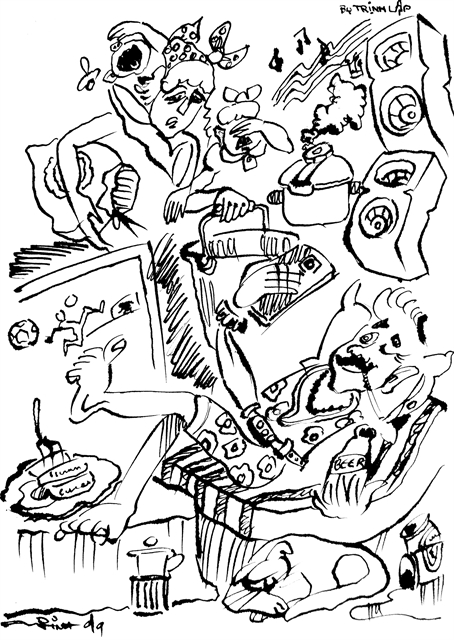 Talk Around Town
Talk Around Town

Outrage over a video of a man viciously beating his wife while she holds their infant baby went viral in Viet Nam over the last week or so, with people at home and abroad shocked by the brute’s savagery.

|
| Illustration by Trịnh Lập |
Outrage over a video of a man viciously beating his wife while she holds their infant baby went viral in Việt Nam over the last week or so, with people at home and abroad shocked by the brute’s savagery.
As much as I would like to spread the message that a phenomenal TV series that ended the week before had shown Vietnamese men and fathers in a positive light, I was brought back to reality by this clip.
The video captured the young family in their living room. At the start, the wife holds the baby in her arms walking around the room without much contentment. She seems to have given birth only a few months before, and is still in the postpartum period.
Aside from the despicable actions of her excuse to the brutal husband, the woman in the video could also be suffering the pain many women experience shortly after giving birth.
Tough time
While there’s a lot of literature on pregnancy and delivery, there’s comparatively little advice available for the next stage for new mothers. You tend to overlook your tattered body and fragile mood because you're facing the more daunting task of taking care of your baby.
Women who have given birth struggle to come to terms with their bodies, not only the physical pain, but those who breastfeed have no control over the heat that burns from inside when your milk rushes to your chest. Usually, you sweat profusely and can do nothing about it.
While women feel differently about the physical changes, all feel overwhelmed, stressed, anxious or depressed to a degree, all symptoms they weren’t expecting after successfully delivering a child,
You struggle with the thought that you should be feeling on top of the world simply by hugging the little angel in your arms, but you actually feel the opposite.
Ann Dunneworld, a Dallas psychologist and co-author of Life Will Never Be the Same: The Real Mom's Postpartum Survival Guide, was quoted by todaysparent.com as saying, "Some of your hormones go from the highest they ever will be to the lowest, just before delivery to just after.”
As your hormones change, estrogen and progesterone levels drop after birth, which can cause mood swings, anxiety, sadness or irritability, or worse, postpartum depression.
Another hormone, ocytocin, i.e. the bonding/love hormone, is rising, turning on mothering behaviour, part of it to detect the danger in your child's surroundings, and as a result, postpartum anxiety can go up.
All these symptoms can go away after a few months when your hormones level out.
On top of those hormones, thyroid hormones, which help control body temperature, metabolism and organ function, can be affected by giving birth, too.
"Symptoms can include insomnia, anxiety, rapid heart rate, fatigue, weight loss and irritability (one to four months after birth) or fatigue, weight gain, constipation, dry skin and depression (four to eight months after birth). Your doctor can monitor your thyroid levels with blood tests and prescribe medication if necessary," according to todaysparent.com.
In a nutshell, after a woman gives birth she may seem more demanding or difficult, but it’s not because she’s become a terrible person overnight. Her partner needs to understand that mood swings come with the territory of childbirth, be understanding and accommodate her.
Having been through that period, I have encountered more than once the tension many couples go through. The woman looks helpless. The man looks uninterested. Between them, a beautiful baby sleeps. I often see them at a cafe or in a public place, trying to navigate a tough conversation.
The way they look at each other speaks for itself. It’s as if the woman is saying, "I loved you. You loved me. This child of ours was born from our love. Why am I not happy now?"
It’s as if the man is saying, "I loved you. You loved me. I worked hard to support our family. I helped you whenever I could. Why are you still not happy?"
Fantasy
The simple truth is that a woman will be able to feel happy again when her hormones are level.
What can men do to help? Spend some quality father-child time alone. Let the mother have an hour in peace, relaxing, having a facial, having her nails done or simply sipping a warm cup of tea.
While she’ll still undoubtedly worry about her child to a degree, a least she’ll have some more time, for the first time in months.
In the case of the woman in the video clip, while she initially filed charges against her husband, she has since dropped them, reasoning he is still her children’s father.
While it may seem irrational from the outside to let such a beast off the hook, it goes to show the lengths a dedicated mother will go to for her children. She is reportedly seeking a divorce.
In domestic violence cases, it’s irrelevant what a man’s purported ‘reason’ may be for beating his partner. It has nothing to do with the woman.
I have a fantasy where I picture that if a woman makes a man's arm busy, say, by holding his baby, it won't be free to hit her.
I also have a fantasy where women won’t have to worry about abuse from their own partners. Sadly, they both seem far-fetched. VNS




